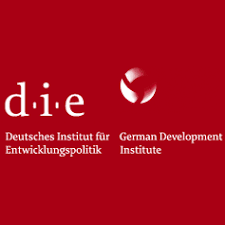Location
The German Development Institute, Deutsches Institut für Entwicklungspolitik, (DIE) is one of the leading think tanks for development policy worldwide.
The Institute is based in the UN-City of Bonn. DIE builds bridges between theory and practice and works within international research networks. The key to DIE’s success is its institutional independence, which is guaranteed by the Institute’s founding statute.
The German DIE is a non-profit company with limited liability. The Institute’s institutional independence is guaranteed by its founding statute. The shareholders are the Federal Republic of Germany and the Federal State of North Rhine-Westphalia.
Since its founding in 1964, the German Development Institute / Deutsches Institut für Entwicklungspolitik (DIE) has based its work on the interplay between Research, Consulting and Training. These three areas complement each other and are the factors responsible for the Institute’s distinctive profile.
Members:
Resources
Displaying 6 - 10 of 10The devolution of the land and building tax in Indonesia
In order to stimulate revenue mobilisation and local autonomy, some governments decentralise property taxes to the municipal level. Indonesia did so in a gradual process between 2010 and 2014, transferring responsibility for the rural and urban land and building tax to its nearly 500 cities and districts. But has this so-called devolution led to strengthening the property tax as a source of public revenue? The present study explores whether decentralisation leads to a better use of the land and building taxation potential in Indonesia.
What is the potential for a climate, forest and community friendly REDD+ in Paris?
Reducing Emissions from Deforestation and Forest Degradation (REDD+) is a mitigation instrument that creates a financial value for the carbon stored in standing forests. The purpose of REDD+ is to provide incentives for developing countries to mitigate forest-related emissions and to foster conservation, sustainable management of forests and the enhancement of forest carbon stocks.
Why power matters in Payments for Environmental Services (PES)
Payments for environmental services (PES) are payments to land owners whose land management practices help to provide environmental services (ES). In the context of watershed environmental services, the most important services are the supply, purification and regulation of water. PES was conceived as an instrument for facilitating the transition to a green economy. From this perspective, PES is a win-win solution to environmental degradation and poverty. Today, PES is a widely used policy tool for conservation.
Sustainability standards and certification: towards sustainable palm oil in Indonesia?
Palm oil production is currently the focus of much contentious debate. On the one hand, palm oil production has a substantial, positive (socio-) economic impact in countries which produce it, like Indonesia, and is a powerful engine of rural development. On the other hand, palm oil production has a severe negative impact regarding ecological and social sustainability. This is due above all to its large carbon footprint, reduced biodiversity, and its potential for triggering land rights conflicts.
Biodiesel in India: value chain organisation and policy options for rural development
India promotes the production of biodiesel from tree-borne oilseeds. This is seen as an option for substituting fossil fuels, reducing CO2 emissions, afforesting wastelands, and generating rural employment. Critics, however, claim that it may lead to food scarcity and seizure of common lands by corporate investors. This report shows that biodiesel production in India has mainly positive effects. As it is promoted on the basis of non-edible oil seeds on marginal lands, the risks of driving up prices for edible oil or crowding out food production are relatively low.


